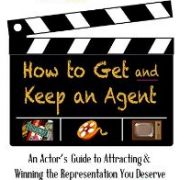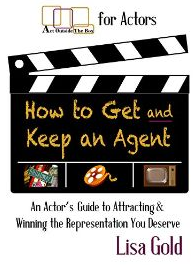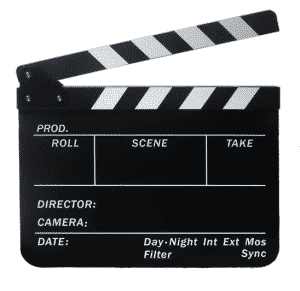Shorter is Better – Statistically Speaking
 As actors we love a good story so we tell them a lot. As a woman, I know I have the urge to tell all of the minor components that set up the actual point to what it is I really want to say before saying it. The POINT of it all. I’m not sure that’s an entirely female quality but I’ve noticed it with my girlfriends where my guy friends seem to get to their point a little faster. I’ve even been told I talk too much. Whaaaat? Well now I’m told I write too much. In fact this first paragraph is not even needed to get to the point of what I’m writing today, but I’m keeping it in as an example!
As actors we love a good story so we tell them a lot. As a woman, I know I have the urge to tell all of the minor components that set up the actual point to what it is I really want to say before saying it. The POINT of it all. I’m not sure that’s an entirely female quality but I’ve noticed it with my girlfriends where my guy friends seem to get to their point a little faster. I’ve even been told I talk too much. Whaaaat? Well now I’m told I write too much. In fact this first paragraph is not even needed to get to the point of what I’m writing today, but I’m keeping it in as an example!
The point I am trying to make here is that actors talk too much and write too much when submitting to agents and managers. I’ve seen it over and over and over and over again…and I’m here to tell you that less is more, shorter is better, and reps appreciate brevity in their faster-than-most paced world.
Why is shorter better? Because we live in a short-attention-span Universe these days. Twitter limits us to 140 characters and these days when you watch a video, if you’re not inspired or intrigued in the first few seconds of the video, you’re on to the next. A demo reel used to be 3 minutes, then two, and now one and a half minutes tops is recommended. But even better than that are shorter 10 to 15 second clips. Again why? Because we are all speeding through our day with content flying at us constantly. It’s all about time, or lack there of.
The statistics are staggering. Regular people receive close to 100 emails a day, much of it spam, but also messages from people, products and services they actually enjoy. Yet most of these emails are deleted without them being read. As an actor you can probably count on triple that number and thus inundated with choices of what class to go to, what online product to buy, where to go to meet industry, plus all of your personal preferences of things and people you like. Delete, delete, delete, mostly not read.
Now imagine you’re an agent. Really imagine what it must be like to submit actors already on your roster for auditions all day long on your computer and emailing back and forth with casting, on calls pitching, opening mail, answering your personal emails with friends and associates and deal with your own family, AND look at new talent…all clamoring for an agent. Their day is cluttered. And I haven’t even mentioned social media yet. HUGE distraction.
What’s an actor to do to clear through all of that clutter and get attention?
Shorter IS better, so in my next post I’ll give you the guidelines on getting your message across quickly!
By the way, if you’re one of the 15% of people on my email list that opened it up to a partial blog post inside, then one of the 6% of those who clicked on the (read more) link to the entire post, would you do me the honor of being one of the less than 1% of people who will leave a comment below? Now this should be interesting…



 I see actors make a lot of mistakes that could totally be avoided. When it comes to figuring out your fit in the vast marketplace of actors, where there’s a large supply and you’re not yet in demand, distinguishing yourself, i.e. defining your product, is ESSENTIAL. Here are some mistakes to avoid:
I see actors make a lot of mistakes that could totally be avoided. When it comes to figuring out your fit in the vast marketplace of actors, where there’s a large supply and you’re not yet in demand, distinguishing yourself, i.e. defining your product, is ESSENTIAL. Here are some mistakes to avoid:
 When I was doing my live version of my most popular seminar on
When I was doing my live version of my most popular seminar on 
 Remember how crushed you were when you had 3 callbacks for that pilot, were the first choice of the CD and the director, but lost the part to that name actor at the last minute? Sooooo crushed. Well your agent was crushed, too and that was the fourth time that same thing happened to one of her clients this week.
Remember how crushed you were when you had 3 callbacks for that pilot, were the first choice of the CD and the director, but lost the part to that name actor at the last minute? Sooooo crushed. Well your agent was crushed, too and that was the fourth time that same thing happened to one of her clients this week. 
 doesn’t “get me” is a phrase I’ve heard a lot as a consultant and now since being in the shoes of representation I can honestly tell you why. Ready? Your agent most likely doesn’t speak your language.
doesn’t “get me” is a phrase I’ve heard a lot as a consultant and now since being in the shoes of representation I can honestly tell you why. Ready? Your agent most likely doesn’t speak your language. 
 Yes, your agent has other clients. Deal with it. Your agent would go hungry if she only had you as a client. She has to have “everything on the grocery store shelf” to have the best shot at making a living.
Yes, your agent has other clients. Deal with it. Your agent would go hungry if she only had you as a client. She has to have “everything on the grocery store shelf” to have the best shot at making a living. 
 OK, by saying your agent isn’t an angel, I’m not disparaging their mood, mode or how they operate. What I’m trying to say is that your agent is not here to save you!
OK, by saying your agent isn’t an angel, I’m not disparaging their mood, mode or how they operate. What I’m trying to say is that your agent is not here to save you! 






